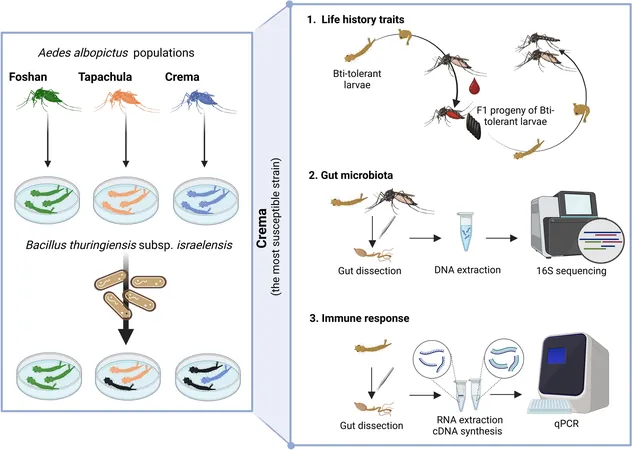
Shocking Discovery: How Bacillus thuringiensis Affects Aedes albopictus Mosquitoes!
2024-11-07
Author: Jia
Vector-borne diseases present a grave threat to global health, causing over 700,000 fatalities every year. Among the worst offenders are dengue, chikungunya, and Zika viruses, which have seen alarming increases in both prevalence and geographic spread over the last half-century.
The primary culprits behind this disease transmission? Aedes aegypti and Aedes albopictus mosquitoes. With vaccines and treatments for these pathogens still lacking or extremely limited, the focus has shifted towards vector control, particularly through the use of environmentally friendly larvicides derived from Bacillus thuringiensis subsp. israelensis (Bti).
Bti is renowned for its larvicidal properties, acting through parasporal crystals that release potent protoxins when ingested by mosquito larvae. Upon reaching the alkaline environment of the larval midgut, these toxins activate, leading to catastrophic cell damage and the prompting of fatal infections. But what happens to the mosquitoes that survive this lethal challenge and become Bti-tolerant?
Recent research has unveiled that while these Bti-tolerant Aedes albopictus mosquitoes initially survive exposure, they carry a hidden cost.
These mosquitoes often face reduced fitness that manifests at their adult stage. Scientists conducted a rigorous investigation into the long-term impacts of Bti on the fitness, gut microbiota, and immune responses of these tolerant mosquitoes, raising new concerns about our ability to control their populations effectively.
The Experiment Breakdown
Researchers utilized three distinct Aedes albopictus laboratory populations from Foshan, Tapachula, and Crema, putting them through a series of tests to assess their susceptibility to Bti. Through careful dose-response assessments, they identified which populations are most affected by the treatment, ultimately focusing on the Crema strain for further experimentation.
In a chilling revelation, only 45% of Bti-tolerant larvae successfully transitioned to adulthood—a stark contrast to the 73% emergence rate seen with control populations. Even amongst those that survived, females born from Bti-tolerant larvae showed a drastic decline in longevity, with median survival dropping from 24 days for controls to just 10 days for the Bti-tolerant group!
Moreover, while both groups exhibited a similar blood-feeding rate, the females from Bti-tolerant larvae produced significantly fewer eggs, effectively reducing potential offspring. Strikingly, this reproductive deficit does not seem to pass down to the next generation, indicating that Bti's effects are primarily restricted to the tolerant stage.
The Gut Microbiota Connection
Perhaps more interestingly, the study did not stop at fitness metrics; it delved into the gut microbiota as well. Analyzing the microbiota of both larvae and adults reveals quite a shift in bacterial composition due to Bti exposure. A total of 291 genera were identified, with notable increases in bacteria like Enterobacter and Acinetobacter in the gut of Bti-tolerant larvae, indicating a major reshaping of microbial communities.
Not only did exposure to Bti alter the overall diversity of the gut microbiota, but this change seems to carry a crucial impact on mosquito health. It highlights a duality where Bti-training effectively prepares mosquitoes to combat toxins, but this altered gut community may also hinder their nutritional absorption and immune responses.
Immune Responses and the Toll Pathway
Among the immune responses triggered by Bti are alterations in the expression of several key immune-related genes. The research indicated that Bti exposure increases the transcription of immune pathways in larvae, including those governed by the Toll and IMD signaling pathways. Notably, some immune responses persist even after transition to adulthood among Bti-tolerant populations.
Surprisingly, while immune gene expression may offer some immediate benefits against pathogens, it may also point to a trade-off with fitness, as mosquitoes may trade longevity and reproductive vigor for heightened defenses.
Conclusion: A Wake-Up Call for Vector Control Strategies
The current findings are a stark reminder of the complexities surrounding the use of Bti as a mosquito control agent. The study reveals not just the direct effects of a powerful biological tool but also its potential to induce tolerance in mosquito populations, subsequently shaping their microbiota and immunity in unforeseen ways.
As new diseases like West Nile and potentially hybrid strains of existing viruses continue to emerge, understanding the nuanced biological repercussions of our control strategies is essential. The implications extend beyond mere population control; they point to a deeper need for comprehensive approaches that consider the ecological and evolutionary ramifications on the organisms we aim to manage.
As we move forward, this research emphasizes a critical question: Are we inadvertently breeding a new generation of super mosquitoes? It’s time we consider the broader consequences of our interventions in the war against vector-borne diseases!



 Brasil (PT)
Brasil (PT)
 Canada (EN)
Canada (EN)
 Chile (ES)
Chile (ES)
 España (ES)
España (ES)
 France (FR)
France (FR)
 Hong Kong (EN)
Hong Kong (EN)
 Italia (IT)
Italia (IT)
 日本 (JA)
日本 (JA)
 Magyarország (HU)
Magyarország (HU)
 Norge (NO)
Norge (NO)
 Polska (PL)
Polska (PL)
 Schweiz (DE)
Schweiz (DE)
 Singapore (EN)
Singapore (EN)
 Sverige (SV)
Sverige (SV)
 Suomi (FI)
Suomi (FI)
 Türkiye (TR)
Türkiye (TR)